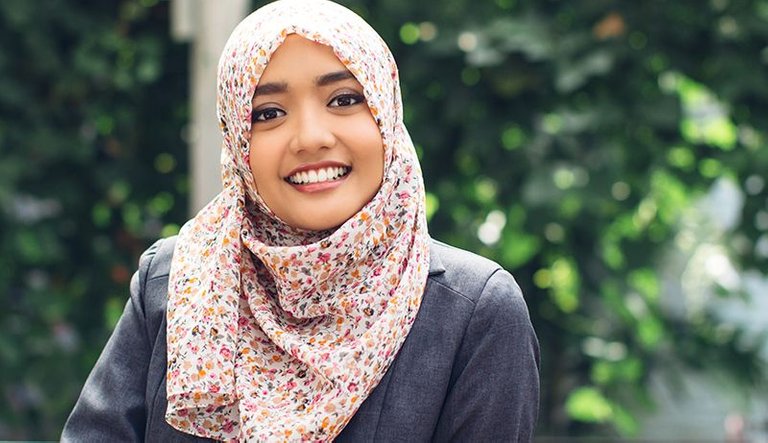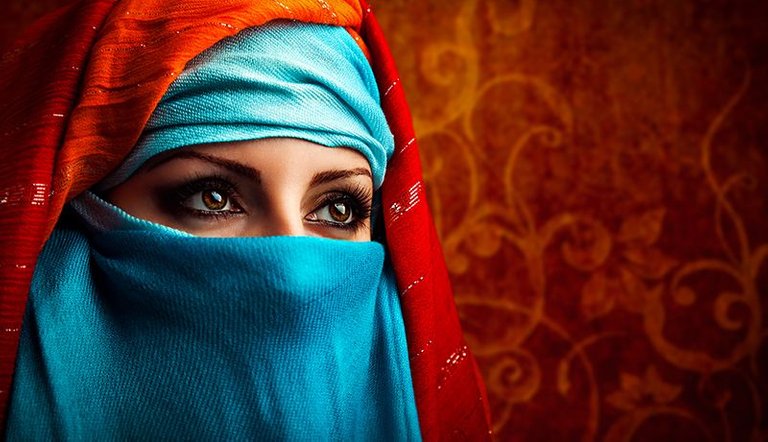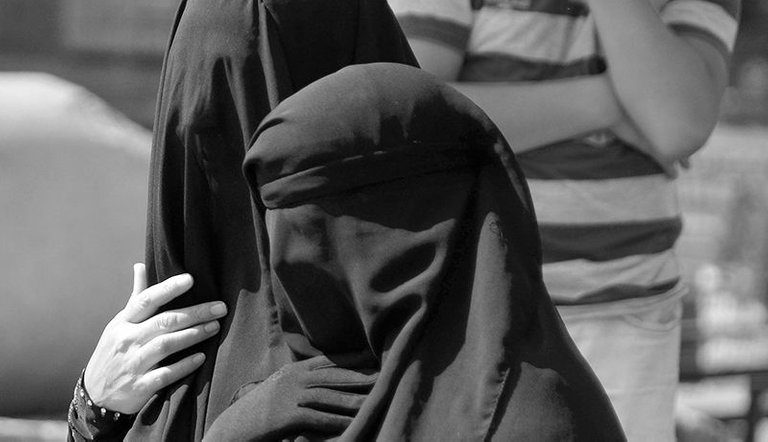
As many of you know, the government of Indonesia is secular, but the country has a Muslim majority of approximately 90%. The overwhelming majority of Muslims here are moderate, and it’s rare to see a woman who covers her face.
There are no laws about what women can and cannot do. In fact, Indonesian women hold prominent positions both in the government and in the private sector.
In family matters, women often control the family finances. The situation is changing a bit now, but traditionally, the man handed his salary over to his wife every payday. Then the wife gave her husband just enough money each day for lunch, cigarettes, or whatever. At restaurants, the bill is often brought to the woman because it is generally assumed that she’s the one who has the money.
So it’s been clear to me since I arrived here 30+ years ago that women are not second class citizens by a long shot. However, I’d always thought of head scarves as a sign of female oppression. Obviously, I had to re-think that attitude as it related to the situation in Indonesia. After all, the person who controls the money in a relationship has a lot of power.
Many Indonesian women cover their hair with a hijab. Then to round out their outfit, they might wear a long, loose garment that conceals the shape of the body, or they might instead wear regular clothes or even skin-tight blue jeans. In other words, wearing a hijab does not mean that the rest of the woman’s clothing is Muslim.
To clarify, the most common kinds of Muslim dress for women -
A hijab refers to a scarf that covers a woman’s head and neck, leaving the face uncovered - common in Indonesia.

A niqab covers the head, neck, and face with only the eyes showing – rarely seen in Indonesia.

A burka fully covers the face and body with mesh covering the eyes to see through – rarely seen in Indonesia.


The Situation in Indonesia
Wearing a hijab has become very trendy over the past several years. In many cases, hijabs now have more to do with fashion than religion.
It seems to me that hijabs were less prevalent when I first came to Indonesia in 1982 – at least in Jakarta where I was living. Even today, fewer women cover their hair in cosmopolitan Jakarta than in smaller cities or the countryside.
How Much Modesty Is Involved?
In all the years that I’ve been here, I haven’t asked hijab-wearing women about their reasons for wearing it. Why? Well, I know very few women who cover their hair.
Some women wear a hijab only under certain circumstances. My housekeeper, for example, covers her hair only for funerals.
Females within a family might choose differently. For example, a Muslim friend of mine said that she can’t stand to wear one because it’s too hot, but one of her sisters wears it.
Do women who cover their hair go to salons that cater only to women? There’s a women-only salon I go to for facials. I often see women putting their hijab back on after having a facial or having a haircut.
But last week, I was in a salon getting a pedicure. This salon is in a shopping mall and has glass windows all along one side that is open to the passing throngs. This salon has both male and female employees and caters to both male and female customers.
A woman wearing a hijab came in and took off her head scarf. Her stylist was male. He washed and cut her hair, then blew it dry using his hands rather than a brush for styling.
Once her hair was dry, he walked away, and she proceeded to pull her hair back into a pony tail that she pinned under so it was just a bulge. She then pinned a large decorative clip just below the bundled pony tail.
Okay, I didn’t think too much of the decorative clip, but I thought that was the end of that. Wrong. She then spent the next 10 minutes arranging her head scarf – all within view of the passing crowds.
Probably no one walking past had any interest in looking at this woman covering her hair, but they could have - she was visible to both men and women, both inside the salon and outside in the hallway.

Check out my other posts -
Are You a Tourist or a Traveler
Are These 'Facts' Really True? Part 1
Traveling Before vs Traveling Now
Do You Brush Your Dog's Teeth?
Lazy Bum? Teacher? Tour Director? Writer? Which Is It, Kate?

Well you just gave me a whole new view of Muslim women's role. And very interesting information about the hijab. I have an insular view of the world and I really enjoyed hearing about how the world really is, not just the North American-centric view as seen on TV. Thanks!
Thanks, Joanne. Islam in Indonesia is quite different from how it is in Middle East countries. And it's the largest population of Muslims in the world.
I didn't know the difference in the head coverings nor that women in Indonesia handle the money in the family. Excellent! I know I am better money manager than lots of, let's just say, better than some people I've known in my life!
The money issue was difficult for me during the time I was married to an Indonesian because unlike you, I don't handle money well.
Very interesting article, Kate.
Thanks for distinguishing between the hijab and the niqab. I was fuzzy on the difference between those two.
Upvoted already and will resteem and FB/tweet.
Thanks, Angela, for your support. I'm going to look for your posts now.
I wear hijab and i like it.
Thanks, Rayaa. Your child is beautiful. Good luck here on Steemit.
thanks dear
It's actually refreshing to know that in some part of the world women hold such power. I just want to know what the economy there is like?How are the politics? It's often said that if women ran the world most of the problems we have will be non existent.
It's also good to hear that it is a choice for Muslim women to cover their heads and faces but you actually have a choice and do it as a fashion trend? That's just awesome to know.
Thanks, Solomon. The economy here in Indonesia is pretty good - although inflation is high. The middle class is growing very fast - in fact, so fast that it's been difficult for the government to keep up with the goods and services for middle class families. What I mean is that the power grids need to be expanded because as people move up in economic capability, they're using more and more electricity to the point that we have frequent electric outages. Things like that. Thanks for your interest.
You asked about the politics - sorry, but I'm not knowledgeable enough about politics here or in my home country to discuss that.
Wow. Sounds like the country is really growing and heading in a positive direction. This might be a stereotype but I can't wait for more female heads of state especially in these super countries.
What's the cause of the rapid growth in the middle class though?
We call regular power outages load-shedding in South Africa. Maybe tat's the general global term for it. Whatever is called it is a sore thorn in the backside.
In one word - opportunity. That's why the middle class is growing and growing. The government here has been instrumental in improving the economy and creating opportunities for people. Something that might interest you - the government teams up with aid agencies to offer Indonesians the opportunity to study abroad for advanced degrees. Do those people stay in the countries they go to? That's always a risk. But Canada did a study and found that the return rate of Indonesians who studied in Canada for an advanced degree was 100%. They also found that for every dollar Canada invested in the aid program, they got a return of $4 from the Indonesians who were studying there. Maybe I should write a post about this!!
Oh my word! A government that actually does what it is meant to do. Do you have any idea of how foreign of a concept an actively positive government is in most parts of the world? This is truly amazing. I'm genuinely pleasantly shocked right now.
Those people really love their country and wish to see it thrive. I'm not surprised that 100% of them go back.
This is such an interesting topic. You should definitely write about it.
Interesting and very educational, @katebenzin! I didn't know about the different kinds of head coverings in Indonesia. Also, I thought that women that wore hijabs were required to wear them for some reason. Nice to know the truth!
Thanks, Kecia. Women who wear hijabs here often do it because it's been the tradition in the family - although that isn't 100% since in my friend Susi's family, some of her female siblings don't wear it and at least one does.
When I saw the title of this post, I was a bit cautious, because around the world, the issue of Muslim women and head coverings can be a hot topic.
I'd heard both sides of the argument: one side saying that head coverings are a religious symbol, the other side saying that they're a symbol of oppression.
So, as I proceeded to read, I was curious as to what the "outcome" of this article would be. Is she going to say that head scarves are a form of religious obedience or oppression of women...or both?
When I read that, " In many cases, hijabs now have more to do with fashion than religion," I must admit I was a bit relieved.
This article might not be that divisive after all. Good.
It's good to see that, as far as I can tell, women in Indonesia are free to fully express their religous choice.
I also appreciated your definitons of the hijab, the niqab, and the burka.